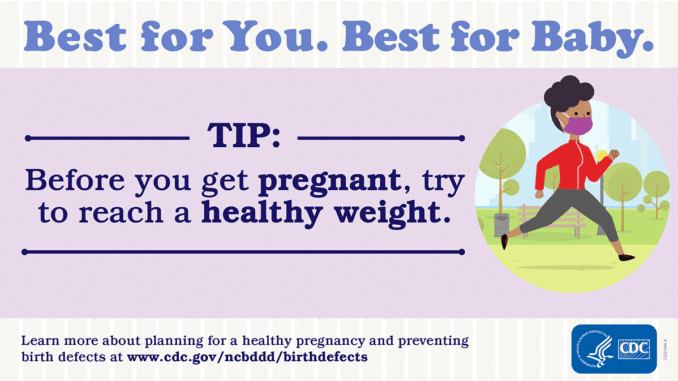
January is National Birth Defects Prevention Month. Join the nationwide effort to raise awareness of birth defects and their impact on families!
The messages and materials provided in this toolkit can be used by federal agencies, organizations, individuals, and other digital ambassadors committed to promoting steps women can take to have a healthy pregnancy.“Best For You. Best For Baby.” 5 Tips for Preventing Birth Defects.
Before you get pregnant, try to reach a healthy weight.
Obesity increases the risk for several serious birth defects and other pregnancy complications. If you are underweight, overweight, or have obesity, talk with your healthcare provider about ways to reach and maintain a healthy weight before you get pregnant. Focus on a lifestyle that includes healthy eating and regular physical activity.COVID-19: How to Be Physically Active While Social Distancing
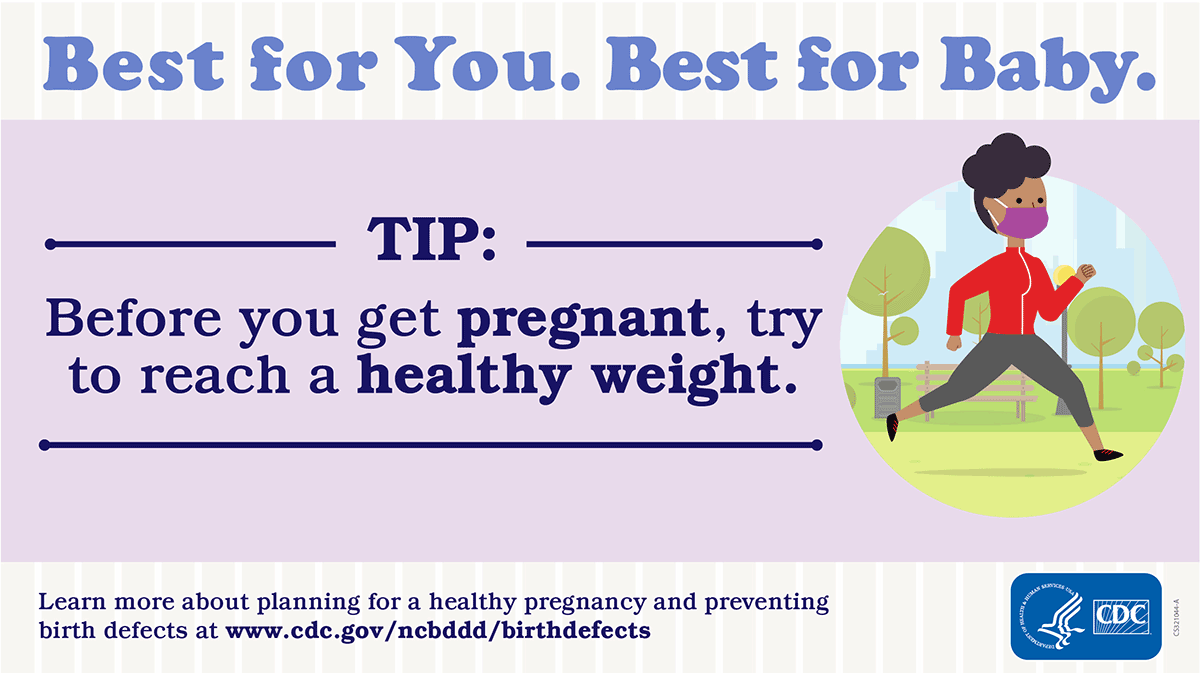
Be sure to take 400 micrograms (mcg) of folic acid every day.
Folic acid is important because it can help prevent some major birth defects of the baby’s brain and spine. If you plan to or could become pregnant, you should consume 400 micrograms (mcg) of folic acid every day to ensure your baby’s proper development and growth. In addition to eating foods with folate from a varied diet, you can get folic acid from
- Taking a vitamin that has folic acid in it;
- Most vitamins sold in the United States have the recommended daily amount of folic acid (400 mcg) that you need.
- Vitamins can be found at most local pharmacy, grocery, or discount stores. Check the label on the bottle to be sure it contains 100% of the daily value of folic acid, which is 400 mcg.
- Eating fortified foods;
- You can find folic acid in some breads, breakfast cereals, and corn masa flour.
- Be sure to check the nutrient facts label and look for a product that has “100%” next to folate.
- Getting a combination of the two: taking a vitamin that has folic acid in it and eating fortified foods.
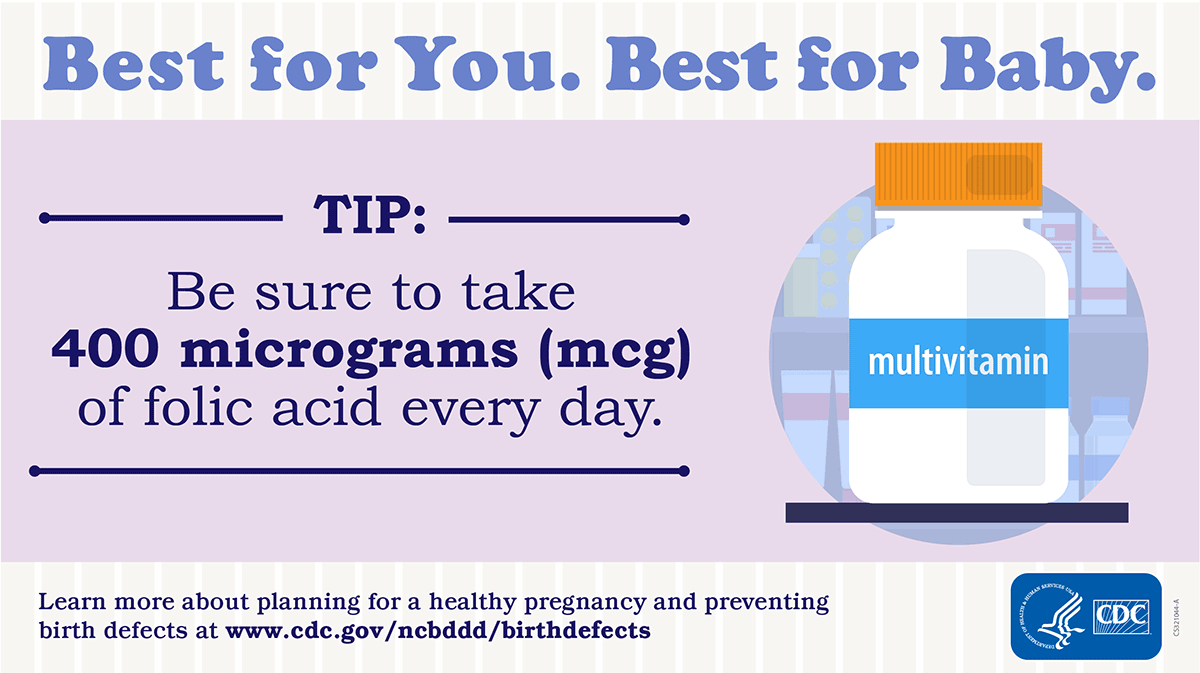
Book a visit with your healthcare provider before stopping or starting any medicine.
Many women need to take medicine to stay healthy during pregnancy. If you are planning to become pregnant, discuss your current medicines with a healthcare provider, such as your doctor or pharmacist. Creating a treatment plan for your health condition before you are pregnant can help keep you and your developing baby healthy.COVID-19: Doctor Visits and Getting Medicines
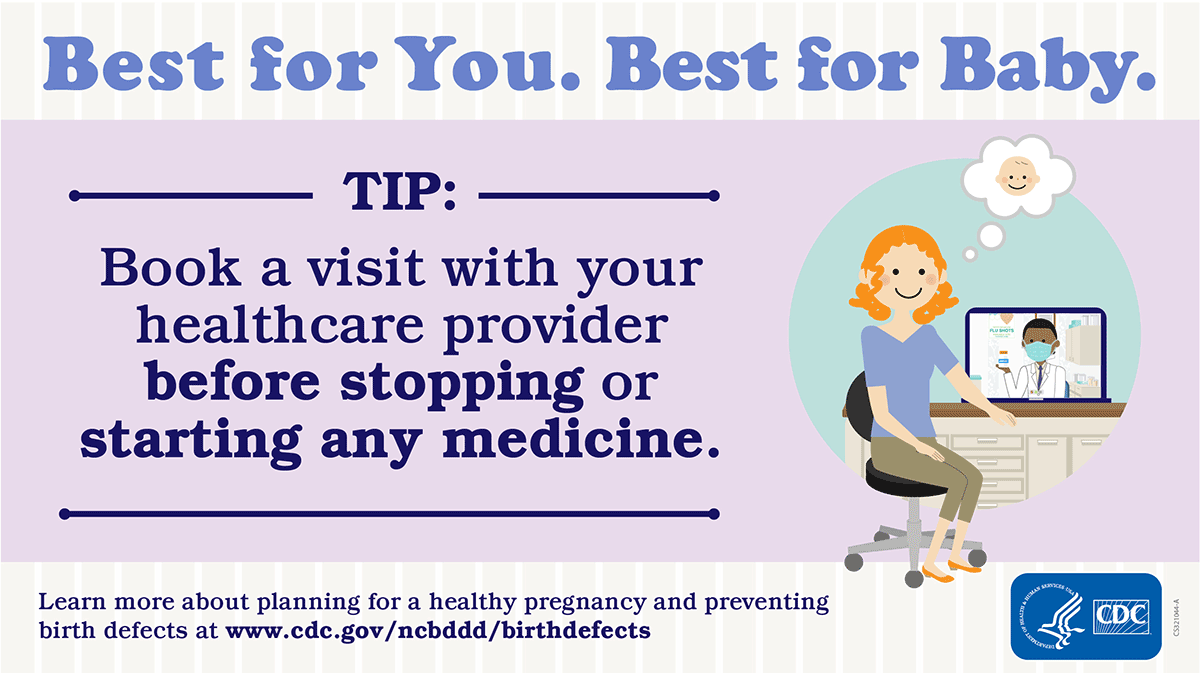
Become up-to-date with all vaccines, including the flu shot.
Vaccines help protect you and your developing baby against serious diseases. Get a flu shot annually and a whooping cough vaccine (also called Tdap) during each pregnancy to help protect yourself and your baby.
-
- Flu: You can get the flu shot before or during each pregnancy.
- Whooping Cough: You can get the whooping cough vaccine in the last three months of each pregnancy.
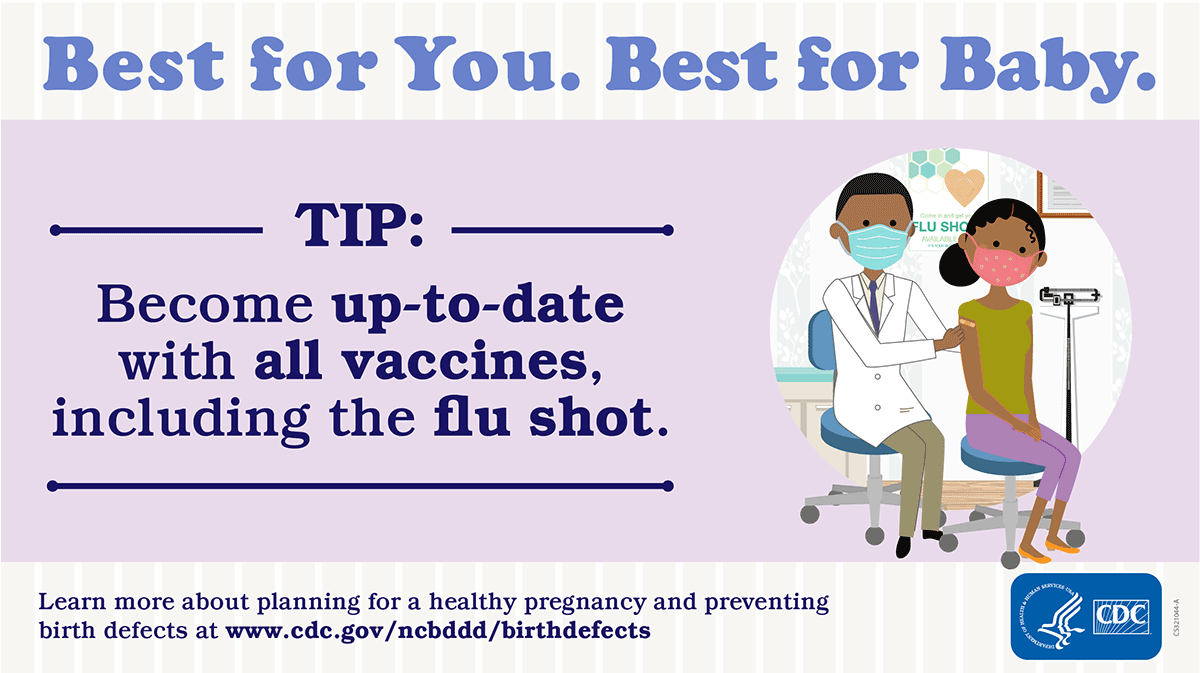
Boost your health by avoiding substances that are harmful during pregnancy.
Alcohol: There is no known safe amount of alcohol during pregnancy or when trying to get pregnant. Alcohol can cause problems for a developing baby throughout pregnancy, so it’s important to stop drinking alcohol when you start trying to get pregnant and during your pregnancy.
Tobacco: Smoking causes cancer, heart disease, and other major health problems. Smoking during pregnancy can also harm the developing baby and can cause certain birth defects. Quitting smoking will help you feel better and provide a healthier environment for your baby.
Other Drugs: Using certain drugs during pregnancy can cause health problems for a woman and her developing baby. A healthcare provider can help you with counseling, treatment, and other support services.COVID-19: Alcohol and Substance Use
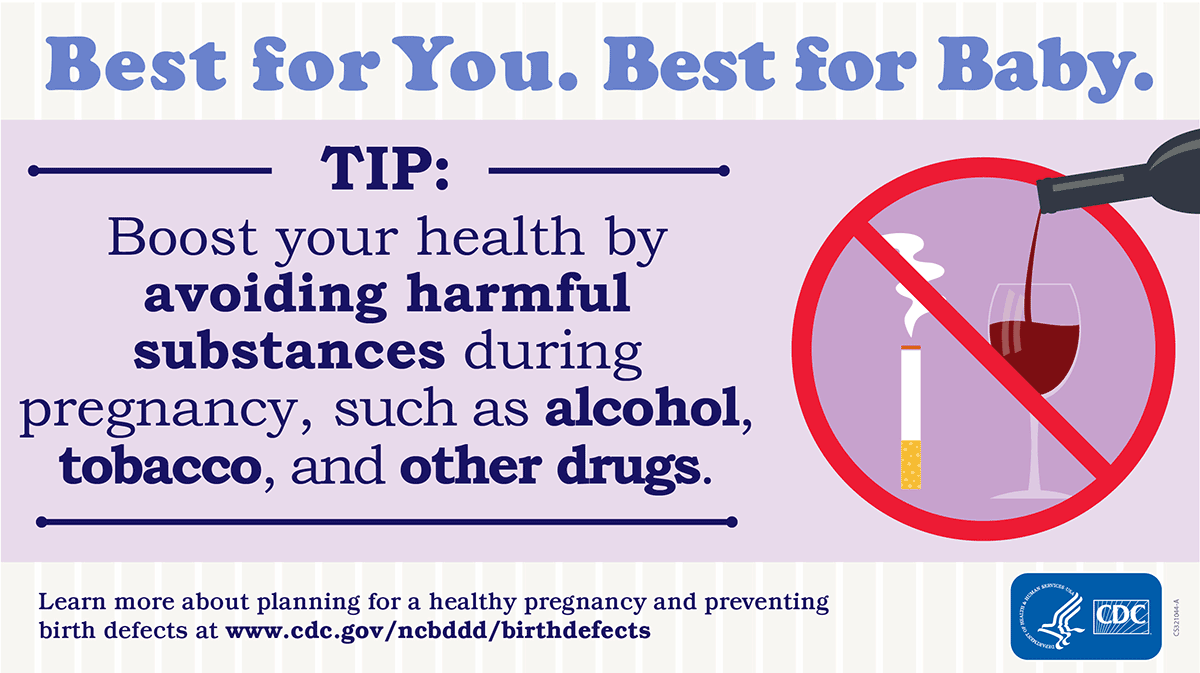
“Best For You. Best For Baby.” Social Media
Use the National Birth Defects Prevention Month hashtag (#Best4YouBest4Baby) to help us track tweets, likes, clicks, and other engagement. The posts below are example options that you can modify to fit your organization’s mission or individual preferences.
Twitter Messages
- Thinking about pregnancy? You can increase your chances of having a healthy baby by managing health conditions & adopting healthy behaviors before becoming pregnant. #Best4YouBest4Baby https://www.cdc.gov/ncbddd/birthdefects/prevention-month.html
- Millions of pregnant women have gotten flu shots over many years with a good safety record. Protect yourself and your developing baby by getting your flu shot! #Best4YouBest4Baby https://www.cdc.gov/ncbddd/birthdefects/prevention-month.html
- Pregnant? Here are some tips for staying healthy during the COVID-19 pandemic, including keeping all of your healthcare appointments: https://www.cdc.gov/coronavirus/2019-ncov/need-extra-precautions/pregnancy-breastfeeding.html #Best4YouBest4Baby
Facebook Messages
- Are you thinking about getting pregnant soon? Is reaching a healthy weight one of your new year’s resolutions? What’s best for you is also best for your baby! Talk with your doctor about ways to reach and maintain a healthy weight before you get pregnant. https://www.cdc.gov/ncbddd/birthdefects/prevention-month.html
- Making healthy choices now is important for you, but it can also be important for the children you may have one day. Not all birth defects can be prevented, but there are steps you can take to help have a healthy pregnancy. What’s best for you is also best for your baby! https://www.cdc.gov/ncbddd/birthdefects/prevention-month.html
- Pregnant? One way to stay healthy during the COVID-19 pandemic is to limit close-contact with other people as much as possible. Learn more here: https://www.cdc.gov/coronavirus/2019-ncov/need-extra-precautions/pregnancy-breastfeeding.html
Instagram Messages
- Join the conversation this January during National Birth Defects Prevention Month, and share what you’re doing that’s best for you and best for baby! Encouraging women stay healthy during pregnancy can help give babies a healthier start in life. #Best4YouBest4Baby
- Folic acid is a B vitamin that helps our bodies make new cells. If you plan to or could become pregnant, it can help prevent serious birth defects of the brain and spine in developing babies. You can get your 400 micrograms (mcg) of folic acid every day by eating foods with folate from a varied diet, taking a vitamin that has folic acid in it, and eating fortified foods. Be sure to check the nutrition facts label and look for a product that has “100%” next to folate. #Best4YouBest4Baby
Other Birth Defects Prevention Materials To Share
- How Much Do You Know about Birth Defects Quiz? https://www.cdc.gov/ncbddd/birthdefects/quiz/index.html
- Infographics about Birth Defects Prevention https://www.cdc.gov/ncbddd/birthdefects/infographics.html
- Real Stories from Real Families Living with Birth Defects https://www.cdc.gov/ncbddd/birthdefects/stories/index.html
For more visit the original article at: https://www.cdc.gov/ncbddd/birthdefects/prevention-month.html

Be the first to comment